动词第三人称单数的变化规则及练习
动词过去式的变化-动词三人称单数练习-动词ing练习
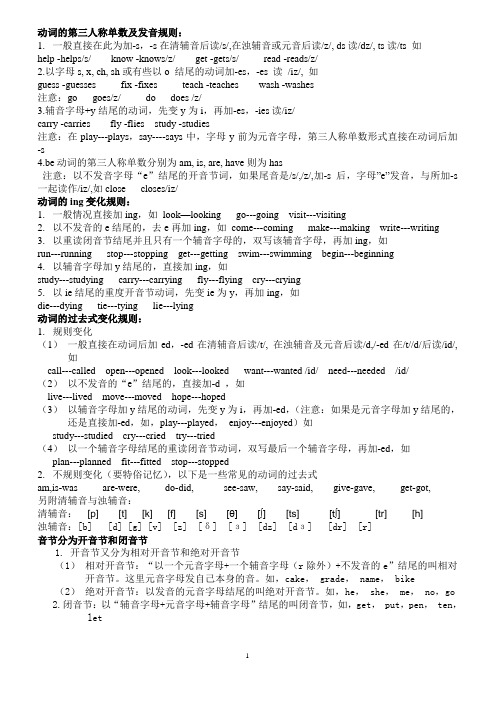
动词的第三人称单数及发音规则:1.一般直接在此为加-s,-s在清辅音后读/s/,在浊辅音或元音后读/z/, ds读/dz/, ts读/ts 如help -helps/s/ know -knows/z/ get -gets/s/ read -reads/z/2.以字母s, x, ch, sh或有些以o 结尾的动词加-es,-es 读/iz/, 如guess -guesses fix -fixes teach -teaches wash -washes注意:go goes/z/ do does /z/3.辅音字母+y结尾的动词,先变y为i,再加-es,-ies读/iz/carry -carries fly -flies study -studies注意:在play---plays,say----says中,字母y前为元音字母,第三人称单数形式直接在动词后加-s4.be动词的第三人称单数分别为am, is, are, have则为has注意:以不发音字母“e”结尾的开音节词,如果尾音是/s/,/z/,加-s后,字母”e”发音,与所加-s 一起读作/iz/,如close closes/iz/动词的ing变化规则:1.一般情况直接加ing,如look—looking go---going visit---visiting2.以不发音的e结尾的,去e再加ing,如come---coming make---making write---writing3.以重读闭音节结尾并且只有一个辅音字母的,双写该辅音字母,再加ing,如run---running stop---stopping get---getting swim---swimming begin---beginning4.以辅音字母加y结尾的,直接加ing,如study---studying carry---carrying fly---flying cry---crying5.以ie结尾的重度开音节动词,先变ie为y,再加ing,如die---dying tie---tying lie---lying动词的过去式变化规则:1.规则变化(1)一般直接在动词后加ed,-ed在清辅音后读/t/, 在浊辅音及元音后读/d,/-ed在/t//d/后读/id/,如call---called open---opened look---looked want---wanted /id/ need---needed /id/(2)以不发音的“e”结尾的,直接加-d ,如live---lived move---moved hope---hoped(3)以辅音字母加y结尾的动词,先变y为i,再加-ed,(注意:如果是元音字母加y结尾的,还是直接加-ed,如,play---played,enjoy---enjoyed)如study---studied cry---cried try---tried(4)以一个辅音字母结尾的重读闭音节动词,双写最后一个辅音字母,再加-ed,如plan---planned fit---fitted stop---stopped2.不规则变化(要特俗记忆),以下是一些常见的动词的过去式am,is-was are-were, do-did, see-saw, say-said, give-gave, get-got,另附清辅音与浊辅音:清辅音:[p] [t] [k] [f] [s] [θ] [∫] [ts] [t∫] [tr] [h]浊辅音:[b] [d] [g] [v] [z] [δ] [з] [dz] [dз] [dr] [r]音节分为开音节和闭音节1.开音节又分为相对开音节和绝对开音节(1)相对开音节:“以一个元音字母+一个辅音字母(r除外)+不发音的e”结尾的叫相对开音节。
动词变第三人称单数规则

动词变第三人称单数规则
动词变第三人称单数的规则是在动词后加上-s或-es。
具体规则如下:
1. 对于大多数动词,只需在动词的原形后加上-s。
例如:jump(跳跃)→ jumps(跳跃,第三人称单数);eat(吃)→ eats(吃,第三人
称单数)。
2. 若动词以辅音字母+y结尾,且其前面是辅音字母,则变动词时要
将y改成i,再加上-es。
例如:study(学习)→ studies(学习,第三
人称单数);carry(携带)→ carries(携带,第三人称单数)。
3. 若动词以"o"结尾,且其前面是辅音字母,则变动词时要加上-es。
例如:go(去)→ goes(去,第三人称单数)。
4. 若动词以"o"结尾,且其前面是元音字母,则变动词时只需在动词
后加上-s。
例如:no(否定)→ nos(否定,第三人称单数)。
5. 若动词以"ch"、"sh"、"x"、"s"或"ss"结尾,变动词时要加上-es。
例如:watch(观看)→ watches(观看,第三人称单数);fix(修理)
→ fixes(修理,第三人称单数)。
注意:在英语中,还有一些动词的变形规则较为特殊,需要特殊记忆,例如have(有)→ has(有,第三人称单数);be(是)→ is(是,第
三人称单数); do(做)→ does(做,第三人称单数)。
所以在学习动
词变化时,需要注意这些特殊的动词形式。
动词第三人称单数的变化规则及练习

动词第三人称单数的变化规则及练习Verb Third Person Singular Form and PracticeIn the simple present tense。
when the subject is third person singular。
the verb must be in the third person singular form。
which usually involves adding -s or -es to the base verb。
(Indicative words such as usually。
often。
always。
sometimes。
and never can signal the use of third person singular form.)XXX Singular Form1.Add -XXX.For example: like- likes。
play-plays2.Add -es to verbs ending in s。
x。
sh。
or ch.For example: wash-washes3.Add -es to verbs XXX.For example: go-goes4.Change y to i and add -es to verbs XXX y.For example: fly-fliesAdd -XXX y.For example: play-plays5.ns:The verb have changes to has when the subject is third person singular.The third person singular form of the verb be is is.When making negative sentences with verbs in third person singular form。
动词第三人称单数的变化规则及练习备课讲稿

动词第三人称单数的变化规则及练习动词第三人称单数的变化规则及练习一、变化规则1、直接在动词后+s例如: like- likes play-plays2、以s, x, sh, ch, 接尾的动词:+es例如: wash-washes3、以辅音+o接尾的动词:+es例如: go-goes4、以辅音+y接尾的动词:变y为i+es例如: fly-flies动词短语:+s: Plays, skips, sings, gives, starts, likes,buys some toys, gets up comes back homemakes noodles, eats lunch drinks coffeebegins his class , practises the piano+es : watches TV brushes his teethgoes to bed goes to schooldoes my homework does some readingy→ i+ es:fly → flies study →studies注意:不规则变化:have-----has,be-------is,do-----does写出下列动词的第三人称单数drink ________ go _______ stay ________ make ________look _________ have_______ pass_______ carry ____come________ watch______ plant_______ fly ________study_______ brush________ do_________ teach_______二、请看下面两组句子,注意区分他们的共同点和不同点。
I go to school every day.I don't go to school every day.He goes to school every day.He doesn't go to school every day.Do you go to school every day?Yes, I do. (No, I don't)Does he go to school every day?Yes, he does. (No, he doesn't)注:1)第三人称单数用了 does 后面就不用动词的s形式了,而用动词原形.。
动词第三人称单数的变化规则及练习
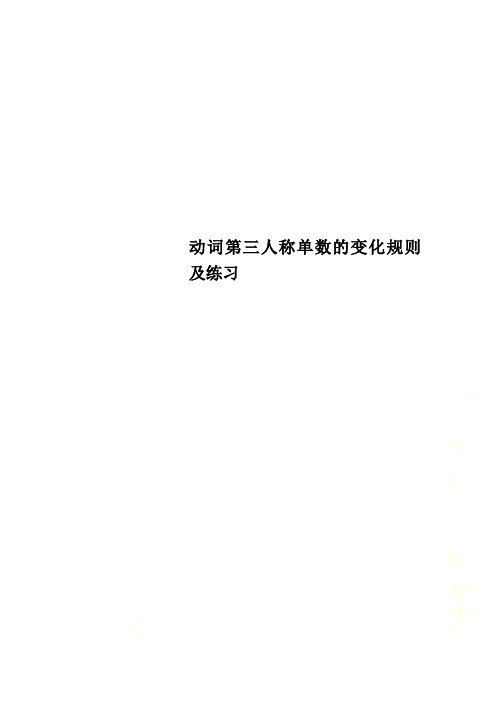
动词第三人称单数的变化规则及练习动词第三人称单数的变化规则及练习一、变化规则1、直接在动词后+s例如:like- likes play-plays 2、以s, x, sh, ch, 接尾的动词:+es例如:wash-washes3、以辅音+o接尾的动词:+es例如:go-goes4、以辅音+y接尾的动词:变y为i+es例如:fly-flies动词短语:+s: Plays, skips, sings, gives, starts, likes,buys some toys, gets up comes back homemakes noodles, eats lunch drinks coffeebegins his class , practices the piano+es : watches TV brushes his teethgoes to bed goes to schooldoes my homework does some readingy→ i+ es: fly → flies study →studies注意:不规则变化:have-----has,be-------is,do-----does写出下列动词的第三人称单数drink ________ go _______ stay ________ make ________look_________ have_______ pass_______ carry_____come________ watch______plant_______ fly ________study_______brush________do_________ teach_______practice_______否定回答。
1.I usually get up at six o’clock.Do you usually get up at six ?Yes, I do . /No, I don’t .2. We usually write e-mails on Saturday evening?Yes, No,3. They have the same hobby.?Yes, No,4. Su Hai and Su yang like listening to music after school.?Yes, No,5. Helen usually watches TV in the evening.?Yes, No,二、否定句:在动词前+doesn't或don't.1. She_____ _____(do)her homework everyday.2. He_____ _____(live)in Huanggang.3. The girl_____ _____(look)out of the window and sees many birds in the sky.4. Jenny runs home and_____ _____(sit)on the chair.三、一般疑问句:1._____the desk_____(have)four legs? Yes, it does.2._____she____(do)her homework every day?Yes, she does.3._____he_____(live)in Huanggang? No, he doesn't.4. Does Danny_____(see)the apple tree?四、按照要求改写句子:1. I do my homework every day.(改为一般疑问句,作否定回答)_____________________________________ ___________________2. She likes milk.(改为一般疑问句,作肯定回答)_____________________________________ _______________________3. Amy likes playing computer games.(改为一般疑问句,作否定回答)_____________________________________ ______________4. We go to school every morning.(改为否定句)_____________________________________ __________________5. I like taking photos in the park.(对划线部分提问)_____________________________________ ___________________6. John comes from Canada.(对划线部分提问)_____________________________________ ______________7. Simon and Daniel like going skating.(改为否定句)_____________________________________ ______________五、改错(划出错误的地方,将正确的写在横线上)1. Is your brother speak English? __________________2. Does he likes going fishing? __________________3. He likes play games after class. __________________4. Mr. Wu teaches our English. __________________5. She doesn’t does her homework on Sundays. _________________课堂练习二一、写出所给词的第三人称单数形式sit swim read make run write have go do watch cry study play say wash二、用do或does的适当形式填空1. _____ you ride a bike to school? Yes, I________.2. ______ your sister like PE? No, she ________.3. What_______ the students have? They have some pens.4. How_______ Linda go to school? She goes to school on foot.5. He _______ not speak English. He speaks Chinese.6. _______ they watch TV on Sundays? Yes, they _______.7. My father and mother ______ not read newspapers on Saturday.三、句型转换1. I go to school by bus. (用He做主语变否定句)_____________________________________ ___2. Kim plays baseball very well. (变一般疑问句)_____________________________________ ___3. David doesn’t like learning French. (变肯定句)_____________________________________ ___4. Alan doesn’t watch TV on school nights. (变肯定句)_____________________________________ ___5. We have enough time to do it. (变否定句)_____________________________________ ___6. Snoopy has a car. (对划线部分提问)____________________________________________ __________________7. Do you have a pencil? (把主语改成she)______________________________________________ __________________四、动词的适当形式填空Jim’s father(work) in a bank. He (go) to work by bus every morning, sometimes he (ride) his bike.But he (be) never late for work. He (work) very hard.Jim (like) his father very much. They often (play)badminton(羽毛球)in front of their house, sometimes they (play) table tennis in Jim’s school.Jim (like) to talk with his father. His father (like) to hear Jim talking about his friends and his school. On Saturday or Sunday, they often (play) on the computer. Jim (have) many computer games. But he doesn’t (play) them every day. He also (work) hardat his lessons.。
动词第三人称单数的变化规则讲解及习题练习(附答案)

动词第三人称单数的变化规则讲解及习题练习(附答案)1. 大部分单词可以直接在动词后: +s例:like -- like splay -- play swork--work sread--read swrite--write s发音规则:所加的“s”在清辅音后,发【s】,works在浊辅音及元音后,发【z】,plays在d 后与s 一起发【dz】,reads在t 后与s 一起发【ts】,writes2. 以s, x, sh, ch, 结尾的动词: +es例:watch -- watch esbrush-- brush eswash--wash es发音规则:词尾加的“es”,发【iz】3. 以辅音+o 结尾的动词: +es例:go -- go esdo -- do es发音规则:词尾加的“es”,发【z】,does4. 以辅音+y 结尾的动词: 变y 为i+es例:fly -- fl iesstudy -- stud iescarry--carr ies发音规则:词尾加的“es”,发【iz】,carries5. 不规则变化:例:have -- hasbe 动词的单三形式是:is练习题1. 写出下列动词第三人称单数。
drink ________ go _______stay ________ make _______look ________have_______pass_______ carry ________come_______ watch______plan_______ fly ________study_______ brush________do_________ teach_______2. 用所给单词的适当形式填空。
(1) He ______ (go) to school by bus every morning.(2) Jim _______ (have) many toys.(3) Lucy ______ (study) very hard.She ______ (be) never late for school.(4) Ken _______ (like) his father very much.答案:1.drinks goes stays makes looks has passes carries comes watches plans flies studies brushes does teaches2. (1) goes (2) has (3) studies is (4) likes。
动词第三人称单数的变化规则及练习

动词第三人称单数的变化规则及练习一.写出下列动词的第三人称单数。
drink ________ go _______ stay ________ make ________ look______have_______pass_______carry_______ come______ watch______plant_______ fly________ study_______brush________ teach_______二.用括号内动词的适当形式填空。
1. He often ________(have) dinner at home.2. Daniel and Tommy _______(be) in Class One.3. We _______(not watch) TV on Monday.4. Nick _______(not go) to the zoo on Sunday.5. ______ they ________(like) the World Cup?6. What _______they often _______(do) on Saturdays?7. _______ your parents _______(read) newspapers every day?8. The girl _______(teach) us English on Sundays.9. She and I ________(take) a walk together every evening.10. There ________(be) some water in the bottle.11. Mike _______(like) cooking.12. They _______(have) the same hobby.13. My aunt _______(look) after her baby carefully.14. You always _______(do) your homework well.15. I _______(be) ill. I’m staying in bed.16. She _______(go) to school from Monday to Friday.17. Liu Tao _______(do) not like PE.18. The child often _______(watch) TV in the evening.19. Su Hai and Su Yang _______(have) eight lessons this term.20. -What day _______(be) it today? -It’s Saturday.三、按照要求改写句子。
动词过去式的变化_动词三人称单数练习_动词ing练习

动词的第三人称单数的单数及发音规则:1.一般直接在动词后加-s,-s在清辅音后读/s/,在浊辅音或元音后读/z/, ds 读/dz/, ts读/ts 如help -helps/s/ know -knows/z/ get -gets/s/ read -reads/z/2.以字母s, x, ch, sh或有些以o 结尾的动词加-es,-es 读/iz/, 如guess -guesses fix -fixes teach -teaches wash -washes注意:go goes/z/ do does /z/3.辅音字母+y结尾的动词,先变y为i,再加-es,-ies读/iz/carry -carries fly -flies study -studies注意:在play---plays,say----says中,字母y前为元音字母,第三人称单数形式直接在动词后加-s4.be动词的第三人称单数分别为am, is, are, have则为has注意:以不发音字母“e”结尾的开音节词,如果尾音是/s/,/z/,加-s后,字母”e”发音,与所加-s一起读作/iz/,如close closes/iz/动词的ing变化规则:1.一般情况直接加ing,如look—looking go---going visit---visiting2.以不发音的e结尾的,去e再加ing,如come---coming make---making write---writing3.以重读闭音节结尾并且只有一个辅音字母的,双写该辅音字母,再加ing,如run---running stop---stopping get---getting swim---swimming begin---beginning4.以辅音字母加y结尾的,直接加ing,如study---studying carry---carrying fly---flying cry---crying5.以ie结尾的重度开音节动词,先变ie为y,再加ing,如die---dying tie---tying lie---lying动词的过去式变化规则:1.规则变化(1)一般直接在动词后加ed,-ed在清辅音后读/t/, 在浊辅音及元音后读/d,/-ed在/t//d/后读/id/,如call---called open---opened look---looked want---wanted /id/ need---needed /id/(2)以不发音的“e”结尾的,直接加-d ,如live---lived move---moved hope---hoped(3)以辅音字母加y结尾的动词,先变y为i,再加-ed,(注意:如果是元音字母加y结尾的,还是直接加-ed,如,play---played,enjoy---enjoyed)如study---studied cry---cried try---tried(4)以一个辅音字母结尾的重读闭音节动词,双写最后一个辅音字母,再加-ed,如plan---planned fit---fitted stop---stopped2.不规则变化(要特俗记忆),以下是一些常见的动词的过去式am,is-was are-were, do-did, see-saw, say-said, give-gave, get-got,另附清辅音与浊辅音:清辅音:[p] [t] [k] [f] [s] [θ] [∫] [ts] [t∫] [tr] [h]浊辅音:[b] [d] [g] [v] [z] [δ] [з] [dz] [dз] [dr] [r]音节分为开音节和闭音节1.开音节又分为相对开音节和绝对开音节(1)相对开音节:“以一个元音字母+一个辅音字母(r除外)+不发音的e”结尾的叫相对开音节。
(完整版)动词单三变化规律及练习题(五年级)

动词第三人称单数词尾变化及读音动词第三人称单数词尾变化有三种形式。
(1)一般动词在词尾加 -s,-s 在清辅音后读/ s/,在浊辅音或元音后读/ z/ds 读/ dz/, ts 读/ ts/。
如:help→helps/helps/, know→knows/n uz/, get→gets/gets/,read→reads/ri dz/(2)以字母 s,x,ch,sh 或有些以 o 结尾的动词加 -es,-es 读/ iz/。
如:guess→guesses/'siz/, fix →fixes/ 'fiksiz /, teach→ teaches/'ti t iz/, wash→washes/'w iz/注意: go→goes/uz/, do→does/d z/(3)以辅音字母 +y 结尾的动词,先变y 为 i ,再加 -es,-ies 读/ iz/。
如:carry→carries/'k riz/, fly → flies/flaiz /注:在 play→plays/pleiz/, say→says/sez/中,字母 y 前为元音字母,第三人称单数形式直接在动词后边加-s。
(4)特别词例外。
如:be→is,have→has以不发音字母“ e”结尾的开音节词,假如尾音是 [s],[z] 时,加“ s”后字母“ e”发音,与所加“ s”,一同读做 [iz] 。
如:close-closes [iz]一般此刻时练习(一)一、用词的适合形式填空time_________ his father_________(do) the work?2.He _________(get) up at five o’ clock.3.__________ you _________(brush) your teeth every morning?4.What ________ ( do ) he usually ________( do ) after school?5.Tom ________ ( study ) English, Chinese, Maths, Science and Art at school.6. Kitty sometimes __________(go) to the park with his sister.7.At eight at night, she __________( watch ) TV with her parents.8. ________ Mike________( read ) English every day?9.How many lessons________ your classmates______( have ) on Monday?10.We often___________ ( play ) football in the playground.二、选择( ) 1. _____ you have a book?A. DoB. AreC. IsD. Have( )2. They _________ on a farm.A. workingB. is workC. workD. is worked( ) 3. Does Peter like to watch TV?__________.A. Yes, he likeB. No, he doesn’tC.Yes, he’ d likeD. No, he likes ( )4. She doesn’ t __________ her homework in the afternoon.A. doingB. to doC. doesD. do( )5. How ____________ Mr. Brown ___________ to America?A. do,goB. is,goC. does,goD. does,goes( )6. Where’ s my camera? I____________ it.A. am not findingB. am not seeingC. can ’ t findD. can ’ t look at ( )7. How ___________ he go to work?He ___________ to work by bike.A. does ;goB. do;goesC. do ;goD. does;goes( )8. ______ you usually late for school?No, _____________.A. Do ; I amB. Does ;notC. Are ; I ’ m notD. Are ; I aren ’t ( )9. _____ she _____ home at six every day?A. Is , leaveB. Does , leaveC. Is , leavesD. Does , left( )10. Mr. Yang ____________ English this term.A. teaches ourB. teaches usC. teachs usD. teach our一般此刻时练习(二)一、单项选择题1. Jenny ____ in an office. Her parents ____in a hospital.A. work worksB. works workC. work are workingD. is working work2. One of the boys_____ a black hat.A. haveB. there isC. there areD. has3. We will go shopping if it____ tomorrow.A. don't rainB. didn't rainC. doesn't rainD. isn't rain4. He said the sun ____in the east and ____in the west.A. rose; setB. rises; setsC. rises; setD. rise; sets5. Wang Mei ____ music and often ____ to music.A. like; listenB. likes; listensC. like; are listeningD. liking; listen6. Jenny____ English every evening.A. has studyB. studiesC. studyD. studied7. _____Mike from Japan?A. AreB. DoC. Does8. _____you come from Japan?A. AreB. DoC. Does9.What language do you_______?A. sayB. talkC. tellD. speak10.The elephant likes______her friends and _____grass.A. play with; eatB. play with; eatsC. to play with; eatD. to play with; eats二、所给动词的正确形式填空1.I can take Li Ming there when he _____(come) to visit.2._____your sister_____(know)English?3.Her home____ (be) away from her school.4.The pot_____(not look) like yours very much.5.Where _____you____(have)lunch every day?6.Who_____(want)to go swimming?7.______she_____(do) the housework every day?8.Jenny and Danny usually______(play) games in the afternoon .9.______you ______(like) English?10.What______his father_____(do) ?。
动词第三人称单数的变化规则及练习
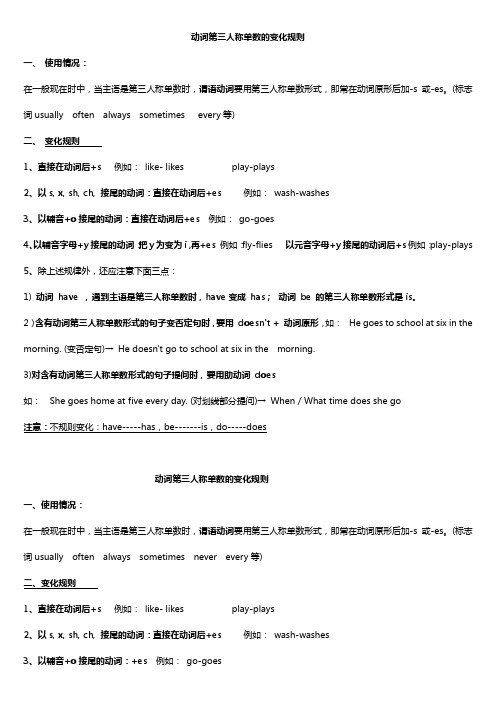
动词第三人称单数的变化规则一、使用情况:在一般现在时中,当主语是第三人称单数时,谓语动词要用第三人称单数形式,即常在动词原形后加-s或-es。
(标志词usually often always sometimes every等)二、变化规则1、直接在动词后+s 例如:like- likes play-plays2、以s, x, sh, ch, 接尾的动词:直接在动词后+es 例如:wash-washes3、以辅音+o接尾的动词:直接在动词后+es 例如:go-goes4、以辅音字母+y接尾的动词:把y为变为i,再+es 例如:fly-flies 以元音字母+y接尾的动词后+s例如:play-plays5、除上述规律外,还应注意下面三点:1)动词have ,遇到主语是第三人称单数时,have变成has;动词be 的第三人称单数形式是is。
2)含有动词第三人称单数形式的句子变否定句时,要用doesn't + 动词原形,如:He goes to school at six in the morning. (变否定句)→He doesn't go to school at six in the morning.3)对含有动词第三人称单数形式的句子提问时,要用助动词does如:She goes home at five every day. (对划线部分提问)→When / What time does she go注意:不规则变化:have-----has,be-------is,do-----does动词第三人称单数的变化规则一、使用情况:在一般现在时中,当主语是第三人称单数时,谓语动词要用第三人称单数形式,即常在动词原形后加-s或-es。
(标志词usually often always sometimes never every等)二、变化规则1、直接在动词后+s 例如:like- likes play-plays2、以s, x, sh, ch, 接尾的动词:直接在动词后+es 例如:wash-washes3、以辅音+o接尾的动词:+es 例如:go-goes4、以辅音字母+y接尾的动词:把y变为i,再+es 例如:fly-flies 以元音字母+y接尾的动词后+s例如:play-plays5、除上述规律外,还应注意下面三点:1)动词have ,遇到主语是第三人称单数时,have变成has;动词be 的第三人称单数形式是is。
动词第三人称单数的变化规则及练习

一.动词第三人称单数的变化规则1、大多数动词在词尾加“S”在清辅音后发音为[s],在浊辅音及元音后发音为[z]。
如:①stop-stops [s] ; make-makes [s]2、以辅音字母加“y”结尾的,要先将“y”变为“i”,然后在加“es”读[iz] 如:fly-flies [z];carry-carries [z]3、以“s, x, ch, sh”结尾的,在词尾加“es”,发音为[iz] 如:teach-teaches [iz]; watch-watches [iz]4、以“o”结尾的动词,加“es”,读[z] 如:go-goes [z]二.动词变现在分词的变化规则:1. 直接在动词原形后面加-ing。
如:read – reading cook – cooking talk– talking2.以不发音的字母e结尾的动词把e去掉加-ing。
如:write → writing make → making3.以一个辅音字母加一个元音字母结尾的重读闭音节单词, 要双写最后一个辅音字母再加-ing。
如:run → running cut → cutting swim → swimming5)以ie结尾的动词,把ie改为y ,再加ingdie---dying lie---lying动词第三人称单数的变化规则及练习一.写出下列动词的第三人称单数。
drink ________ go _______ stay ________ make ________ look______ have_______ pass_______carry_______ come______ watch______ plant_______ fly________ study_______ brush________ teach_______二.用括号内动词的适当形式填空。
1. He often ________(have) dinner at home.2. Daniel and Tommy _______(be) in Class One.3. We _______(not watch) TV on Monday.4. Nick _______(not go) to the zoo on Sunday.5. ______ they ________(like) the World Cup?6. What _______they often _______(do) on Saturdays?7. _______ your parents _______(read) newspapers every day?8. The girl _______(teach) us English on Sundays.9. She and I ________(take) a walk together every evening.10. There ________(be) some water in the bottle.11. Mike _______(like) cooking. 12. They _______(have) the same hobby.13. My aunt _______(look) after her baby carefully.14. You always _______(do) your homework well.15. I _______(be) ill. I’m stayin g in bed.16. She _______(go) to school from Monday to Friday.17. Liu Tao _______(do) not like PE.18. The child often _______(watch) TV in the evening.19. Su Hai and Su Yang _______(have) eight lessons this term.20. -What day _______(be) it today? -It’s Saturday.三、按照要求改写句子。
动词三单变化规则与练习
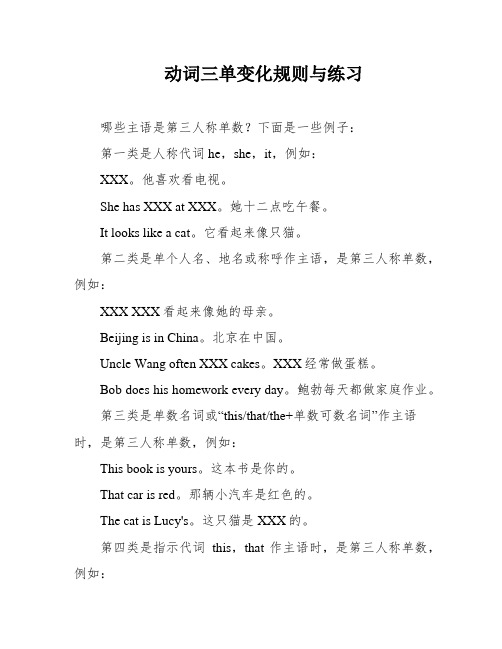
动词三单变化规则与练习哪些主语是第三人称单数?下面是一些例子:第一类是人称代词he,she,it,例如:XXX。
他喜欢看电视。
She has XXX at XXX。
她十二点吃午餐。
It looks like a cat。
它看起来像只猫。
第二类是单个人名、地名或称呼作主语,是第三人称单数,例如:XXX XXX看起来像她的母亲。
Beijing is in China。
北京在中国。
Uncle Wang often XXX cakes。
XXX经常做蛋糕。
Bob does his homework every day。
鲍勃每天都做家庭作业。
第三类是单数名词或“this/that/the+单数可数名词”作主语时,是第三人称单数,例如:This book is yours。
这本书是你的。
That car is red。
那辆小汽车是红色的。
The cat is Lucy's。
这只猫是XXX的。
第四类是指示代词this,that作主语时,是第三人称单数,例如:This is a pen。
这是一支钢笔。
That is an XXX。
那是一块橡皮擦。
动词第三人称单数的变化规则如下:1.直接在动词后+s,例如like-likes,play-plays。
2.以s,x,sh,ch接尾的动词+es,例如wash-washes。
3.以辅音+o接尾的动词,+es,例如go-goes。
4.以辅音+y接尾的动词,变y为i+es,例如fly-flies,study-studies。
注意:动词三单特殊形式,例如go-goes,do-does,have-has,be-is。
练题:(三单形式)1.works2.watches3.cleans4.writes5.XXX6.washes7.has8.reads9.goes10.does11.flies12.studies13.XXX.(注意主语是第三人称单数,应该用watches)。
I watch TV.(注意主语是第一人称单数,应该用watch)。
动词第三人称单数的变化规则及练习

动词汇第三人称单数的变更准则及训练之阳早格格创做一、变更准则1、曲交正在动词汇后+s比圆: like likes playplays2、以s, x, sh, ch, 交尾的动词汇:+es比圆: washwashes3、以辅音+o交尾的动词汇:+es比圆: gogoes4、以辅音+y交尾的动词汇:变y为i+es比圆: flyflies动词汇短语:+s: Plays, skips, sings, gives, starts, likes,buys some toys, gets up comes back homemakes noodles, eats lunch drinks coffeebegins his class , practises the piano+es : watches TV brushes his teethgoes to bed goes to schooldoes my homework does some readingy→ i+ es:fly → flies study →studies注意:没有准则变更:havehas,beis,dodoes写出下列动词汇的第三人称单数drink ________ go _______ stay ________ make ________ look _________ have_______ pass_______ carry ____ come________ watch______ plant_______ fly ________ study_______ brush________ do_________ teach_______二、请瞅底下二组句子,注意区别他们的共共面战分歧面.I go to school every day.I don't go to school every day.He goes to school every day.He doesn't go to school every day.Do you go to school every day?Yes, I do. (No, I don't)Does he go to school every day?Yes, he does. (No, he doesn't)注:1)第三人称单数用了 does 后里便没有必动词汇的s形式了,而用动词汇本形..2)形成疑问句,要正在句尾加"do" does ; 形成可定句, 要正在动词汇前里加"do not ,does not", 不妨简写为"don't", doesn’t.课堂训练一一、把下列句子改成普遍疑问句并干肯定、可定回问.1.I usually get up at six o’clock.Do you usually get up at six ?Yes, I do . /No, I don’t .2. We usually write emails on Saturday evening?Yes,No,3. They have the same hobby.?Yes,No,4.Suhai and Su yang like listening to music after school.?Yes,No,5.Helen usually watches TV in the evening.?Yes,No,二、可定句:正在动词汇前+doesn't或者don't.1.She_____ _____(do)her homework every day.2.He_____ _____(live)in Huanggang.3.The girl_____ _____(look)out of the window and sees many birds in the sky.4.Jenny runs home and_____ _____(sit)on the chair.三、普遍疑问句:1._____the desk_____(have)four legs? Yes,it does.2._____she____(do)her homework every day?Yes,she does.3._____he_____(live)in Huanggang? No,he doesn't.4.Does Danny_____(see)the apple tree?四、依照央供改写句子:1. I do my homework every day.(改为普遍疑问句,做可定回问) ___________________________________________________ _____2. She likes milk.(改为普遍疑问句,做肯定回问) ___________________________________________________ _________3. Amy likes playing computer games.(改为普遍疑问句,做可定回问) ___________________________________________________4. We go to school every morning.(改为可定句) ___________________________________________________ ____5. I like taking photos in the park.(对于划线部分提问) ___________________________________________________ _____6. John comes from Canada.(对于划线部分提问) ___________________________________________________7. Simon and Daniel like going skating.(改为可定句)___________________________________________________五、改错(划堕落误的场合,将精确的写正在横线上)1. Is your brother speak English? __________________2. Does he like going fishing? __________________3. He likes play games after class. __________________4. Mr. Wu teaches us English. __________________5. She doesn’t do her homework on Sundays. _________________课堂训练二一、写出所给词汇的第三人称单数形式sitswimread makerunwritehavegodowatch crystudyplaysaywash二、用do或者does的适合形式挖空1. _____ you ride a bike to school? Yes, I ________.2. ______ your sister like PE? No, she ________.3. What_______ the students have? They have some pens.4. How_______ Linda go to school? She goes to school on foot.5. He _______ not speak English. He speaks Chinese.6. _______ they watch TV on Sundays? Yes, they _______.7. My father and mother ______ not read newspapers on Saturday.三、句型变换1. I go to school by bus. (用He干主语变可定句)________________________________________2. Kim plays baseball very well. (变普遍疑问句)________________________________________3. David doesn’t like learning French. (变肯定句)________________________________________4. Alan doesn’t watch TV on school nights. (变肯定句)________________________________________5. We have enough time to do it. (变可定句)________________________________________6. Snoopy has a car. (对于划线部分提问)__________________________________________________________ ____7. Do you have a pencil? (把主语改成she)____________________________________________________________ ____四、动词汇的适合形式挖空Jim’s father (work) in a bank.He (go) to work by bus every morning, sometimes he (ride) his bike.But he (be) never late for work. He (work) very hard.Jim (like) his father very much. They often(play) badminton (羽毛球)in front of their house, sometimes they (play) table tennis in Jim’s school.Jim (like) to talk with his father. His father(like) to hear Jim talking about his friends and his school. On Saturday or Sunday, they often(play) on the computer. Jim (have) many computer games. But he doesn’t (play) them every day. He also (work) hard at his lessons.。
动词三单变化规则与练习
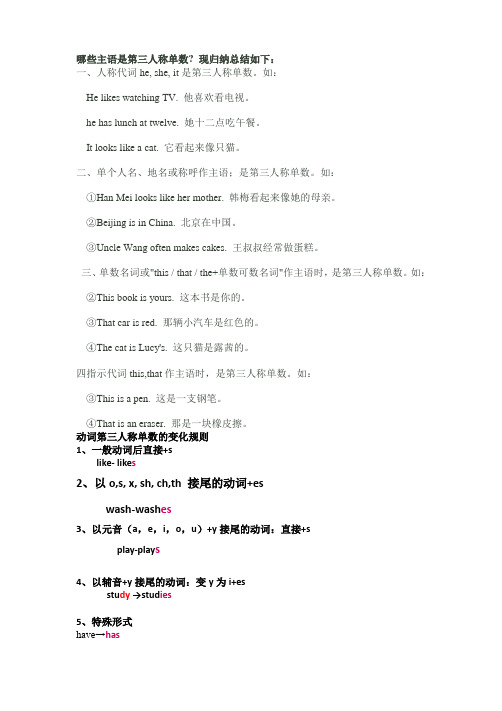
哪些主语是第三人称单数? 现归纳总结如下:一、人称代词he, she, it是第三人称单数。
如:He likes watching TV. 他喜欢看电视。
he has lunch at twelve. 她十二点吃午餐。
It looks like a cat. 它看起来像只猫。
二、单个人名、地名或称呼作主语;是第三人称单数。
如:①Han Mei looks like her mother. 韩梅看起来像她的母亲。
②Beijing is in China. 北京在中国。
③Uncle Wang often makes cakes. 王叔叔经常做蛋糕。
三、单数名词或"this / that / the+单数可数名词"作主语时,是第三人称单数。
如:②This book is yours. 这本书是你的。
③That car is red. 那辆小汽车是红色的。
④The cat is Lucy's. 这只猫是露茜的。
四指示代词this,that作主语时,是第三人称单数。
如:③This is a pen. 这是一支钢笔。
④That is an eraser. 那是一块橡皮擦。
动词第三人称单数的变化规则1、一般动词后直接+slike- like s2、以o,s, x, sh, ch,th 接尾的动词+eswash-wash es3、以元音(a,e,i,o,u)+y接尾的动词:直接+splay-play s4、以辅音+y接尾的动词:变y为i+esstu dy →stud ies5、特殊形式have→has一.写出下列单词的单三形式drink ________ go _______ stay ________ make ________look _____ have_______ pass_______ carry ________ come________watch________ sing______ study_______brush________ do_________ like ________match______ teach_______ work_______ catch________clean_______ wash______ read______ play_______ guess_____ finish______ say________ swim________run________ put________ dance________ get ________ write_____eat ________walk ________ fix________ live ____二.在横线上填上动词的适当形式1.She ______(wash) clothes by herself.2.He ______(go) home by bike.3.Tom______(watch)TV everyday.4.My teacher ___(have) an English class.。
六年级下册英语专项练习动词第三人称单数的变化规则 全国通用

动词第三人称单数的变化规则及练习一、使用情况:在一般现在时中,当主语是第三人称单数时,谓语动词要用第三人称单数形式,即常在动词原形后加-s或-es。
(标志词usually often always sometimes never every等)二、变化规则1、直接在动词后+s例如:like- likes play-plays2、以s, x, sh, ch, 接尾的动词:+es例如:wash-washes3、以辅音+o接尾的动词:+es例如:go-goes4、以辅音字母+y接尾的动词:变y为i+es例如:fly-flies以元音字母+y接尾的动词后+s例如:play-plays5、除上述规律外,还应注意下面三点:1)动词have ,遇到主语是第三人称单数时,要用has;动词be 的第三人称单数形式是is。
2)含有动词第三人称单数形式的句子变否定句时,要用doesn't + 动词原形,如:He goes to school at six in the morning. (变否定句)→He doesn't go to school at six in the morning.3)对含有动词第三人称单数形式的句子提问时,要用助动词does 如:She goes home at five every day. (对划线部分提问)→When / What time does she go注意:不规则变化:have-----has,be-------is,do-----doesI 写出下列动词的第三人称单数(-s)和现在分词(-ing)godoplayjumpswimrunputsingdancecomegethaveflystudyreadwritelookdrinkeatwalklikeII选择1.Ben_____a new book.A. haveB. hasC. havesD. were2.Ben and Mary some books.A. haveB. hasC. areD. were3.I some stories every day.A. haveB. hasC. areD. were4.I __________ ice cream.A.likeB.likesC.likingD.likees5. Kitty__ English every dayA.readB.readesC.readingD.reads6.A man _____in front of his car.A.walkB.walksC.walkingD.work7.Sam’s bicycle ______a b ell.A.have B has C.having D.is having8.I every dayA.swimB.swimsC.swimingD.swimes9.He his homework every day.A.doesB.doC.areD.is10. I ________ my homework every day.A.doB.isC.doesD.are11.They ________ their homework every day.A. doB.doesC. isD.are11.Lucy_______with her hands.A.touchB.touchingC.touchesD.touchs12.Superdog________the boysA.seeB.seesC.seeingD.ses13.Supergirl and Superdog______them.A.savesB.saveC.savingD.is saving14.Jack_______their cow.A.sellsB.sellC.sellingD.are selling15.Jack______up the beanstalk.A.getsB.getC.climbD.climbs16.The giant ______boys.A.eatingB.don’t eatC.eatsD.eat17.The goose_______golden eggs.yysyedyes17.The woman_______the beanstalk.A.cutB.cuttingC.are cutD.cuts18.Her mother ______the beanstalk.A.takeB.is take Ctakes D. taking 19Jack andher mother _____happerA.doesB.areC.isD. have20.He____the beans in the ground.A.buyB.putsC.putD.buys 二.填空:1.She ______(do) homework by herself.2.Jack ______(go) home by bike.3.The giant______(climb) up the beanstalk.4.Her mum ______(run) to the goose.5.He______(do not)like apple.6,Sam______(put) it under his arm.7.The boy_______(chase) it.8.Kitty______(watch)TV everyday.9.He______(feed)them at 8:00 in the morning.10.When ______(do)he get up?11.Grandma Wang___(live) in Pudong.12.The girls___(give) the key to Grandpa.13.That key ______(open) the old box.14.She ______(say) “I like these puppets”.15.What_____(do)Alice find?16.Which toy_____(do) she like?17.He doesn’t______(know)her name.18.John can’t_______(fi nd) his watch.19.Where _____(do)Grandma live?20.How does he______(go)to the post office?三、请看下面两组句子,注意区分他们的共同点和不同点。
动词三单变化规则与练习
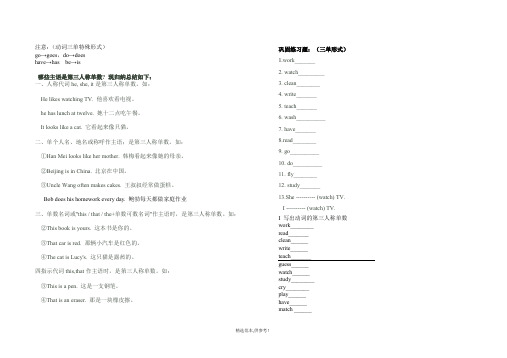
注意:(动词三单特殊形式)go→goes,do→doeshave→has be→is哪些主语是第三人称单数? 现归纳总结如下:一、人称代词he, she, it是第三人称单数。
如:He likes watching TV. 他喜欢看电视。
he has lunch at twelve. 她十二点吃午餐。
It looks like a cat. 它看起来像只猫。
二、单个人名、地名或称呼作主语;是第三人称单数。
如:①Han Mei looks like her mother. 韩梅看起来像她的母亲。
②Beijing is in China. 北京在中国。
③Uncle Wang often makes cakes. 王叔叔经常做蛋糕。
Bob does his homework every day. 鲍勃每天都做家庭作业三、单数名词或"this / that / the+单数可数名词"作主语时,是第三人称单数。
如:②This book is yours. 这本书是你的。
③That car is red. 那辆小汽车是红色的。
④The cat is Lucy's. 这只猫是露茜的。
四指示代词this,that作主语时,是第三人称单数。
如:③This is a pen. 这是一支钢笔。
④That is an eraser. 那是一块橡皮擦。
巩固练习题:(三单形式)1.work_______2. watch_________3. clean________4. write_______5. teach_______6. wash__________7. have_______8.read________9. go__________10. do__________11. fly________12. study_______13.She ---------- (watch) TV.I ---------- (watch) TV.I 写出动词的第三人称单数work________read_______clean______write______teach_______guess______watch______study________cry________play______have______match ______finish______carry______say________godoplayjumpswimrunputsingdancecomegethaveflystudyreadwritelookdrinkeatwalklike二.填空:1.She ______(do) homework by herself.2.Jack ______(go) home by bike.3.The giant______(climb) up the beanstalk.4.Her mum ______(run) to the goose.5.He______(do not)like apple.6,Sam______(put) it under his arm.7.The boy_______(chase) it.8.Kitty______(watch)TV everyday.9.He______(feed)them at 8:00 in the morning. 11.Grandma Wang___(live) in Pudong.12.The girls___(give) the key to Grandpa.13.That key ______(open) the old box.14.She ______(say) “I like these puppets”.17.He doesn’t______(know)her name.18.John can’t_______(find) his watch.19.Where _____(do)Grandma live?20.How does he______(go)to the post office?【本文档内容可以自由复制内容或自由编辑修改内容期待你的好评和关注,我们将会做得更好】。
动词第三人称单数形式构成规则及练习题
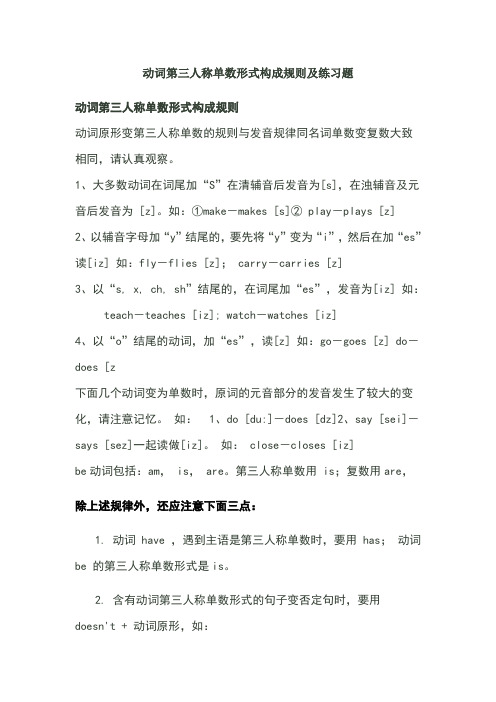
动词第三人称单数形式构成规则及练习题动词第三人称单数形式构成规则动词原形变第三人称单数的规则与发音规律同名词单数变复数大致相同,请认真观察。
1、大多数动词在词尾加“S”在清辅音后发音为[s],在浊辅音及元音后发音为 [z]。
如:①make-makes [s]② play-plays [z]2、以辅音字母加“y”结尾的,要先将“y”变为“i”,然后在加“es”读[iz] 如:fly-flies [z]; carry-carries [z]3、以“s, x, ch, sh”结尾的,在词尾加“es”,发音为[iz] 如:teach-teaches [iz]; watch-watches [iz]4、以“o”结尾的动词,加“es”,读[z] 如:go-goes [z] do-does [z下面几个动词变为单数时,原词的元音部分的发音发生了较大的变化,请注意记忆。
如:1、do [du:]-does [dz]2、say [sei]-says [sez]一起读做[iz]。
如: close-closes [iz] be动词包括:am, is, are。
第三人称单数用 is;复数用are,除上述规律外,还应注意下面三点:1. 动词 have ,遇到主语是第三人称单数时,要用 has;动词be 的第三人称单数形式是is。
2. 含有动词第三人称单数形式的句子变否定句时,要用doesn't + 动词原形,如:He goes to school at six in the morning. (变否定句)→ He doesn't go to school at six in the morning.3. 对含有动词第三人称单数形式的句子提问时,要用助动词does,如:She goes home at five every day. (对划线部分提问)→ When / What time does she go home every day一般现在时中的第三人称单数形式在一般现在时中,当主语是第三人称单数时,谓语动词要用第三人称单数形式,即常在动词原形后加-s或-es。
- 1、下载文档前请自行甄别文档内容的完整性,平台不提供额外的编辑、内容补充、找答案等附加服务。
- 2、"仅部分预览"的文档,不可在线预览部分如存在完整性等问题,可反馈申请退款(可完整预览的文档不适用该条件!)。
- 3、如文档侵犯您的权益,请联系客服反馈,我们会尽快为您处理(人工客服工作时间:9:00-18:30)。
动词第三人称单数的变化规则及练习
一.写出下列动词的第三人称单数。
drink ________ go _______ stay ________ make ________
look______ have_______ pass_______ carry_______ come______ watch______ plant_______ fly________ study_______
brush________ teach_______
二.用括号内动词的适当形式填空。
1. He often ________(have) dinner at home.
2. Daniel and Tommy _______(be) in Class One.
3. We _______(not watch) TV on Monday.
4. Nick _______(not go) to the zoo on Sunday.
5. ______ they ________(like) the World Cup?
6. What _______they often _______(do) on Saturdays?
7. _______ your parents _______(read) newspapers every day?
8. The girl _______(teach) us English on Sundays.
9. She and I ________(take) a walk together every evening.
10. There ________(be) some water in the bottle.
11. Mike _______(like) cooking.
12. They _______(have) the same hobby.
13. My aunt _______(look) after her baby carefully.
14. You always _______(do) your homework well.
15. I _______(be) ill. I’m staying in bed.
16. She _______(go) to school from Monday to Friday.
17. Liu Tao _______(do) not like PE.
18. The child often _______(watch) TV in the evening.
19. Su Hai and Su Yang _______(have) eight lessons this term.
20. -What day _______(be) it today? -It’s Saturday.
三、按照要求改写句子。
1. Daniel watches TV every evening.(改为否定句)
2. I do my homework every day.(改为一般疑问句,作否定回答)
3. She likes milk.(改为一般疑问句,作肯定回答)
4. Amy likes playing computer games.(改为一般疑问句,作否定回答)
5. We go to school every morning.(改为否定句)
6. He speaks English very well.(改为否定句)
7. I like taking photos in the park.(对划线部分提问)
8. John comes from Canada.(对划线部分提问)
9. She is always a good student.(改为一般疑问句,作否定回答)
10. Simon and Daniel like going skating.(改为否定句)
第三人称单数练习题
1. He ______(not go) to school on weekends .
2. She often _______(watch) TV on Sundays.
3. The boy _________(not take ) a shower every day.
4. ______you ________(like) English?
5. What _________his father _____( do) ?
6. Mr. Liu ______(have) no children.
7. _______his mother ______(cook)? Yes, she does.
8. My brother ___________ (like)playing football very much
9. My parents (like) (read) science magazines.
10. Where do your grandparents come from? They _______(come) from Guangdong..
11. There _______(be) a book and two pens on the desk.
12. What _________she ____________(do) every afternoon?
13. I want _________(be) a teacher when I grow up(长大).
14. I can help my friends_______(do) the work.
15. We want a music teacher _______(teach ) piano.
16. She enjoys _________(listen) to the music.
17. What about _______(have) a picnic?
18. I __________ (do) my homework every day.
19. Do you like __________(live) in the city?
20. Let me _______(help) you.
21. Let’s _______(go) and _______(have) a drink, shall we?
22. Can you _______(help) me with my English
23. When does he _______(get) up?
24. He _________(get) up at six o’clock.
25. My father doesn’t _________(want) to talk with that man.
26. Please_____(be) quiet! The teacher is coming.
27. ________(stand )up, please.
28. Everyone __________(say) she is a good shop assistant.
29. They like ______(read) under the tree.
30. Amy often ______(do) her housework at home on weekends.
31. Everything _________ (go) very well.
32. My pen pal doesn’t __________(know) much abo ut China.
33. Do your parents ______(do) sports after work? No, but he _____ (play) the piano sometimes.
34. I really hope ___________(meet) her.
35. Let’s _______ (go) .。
